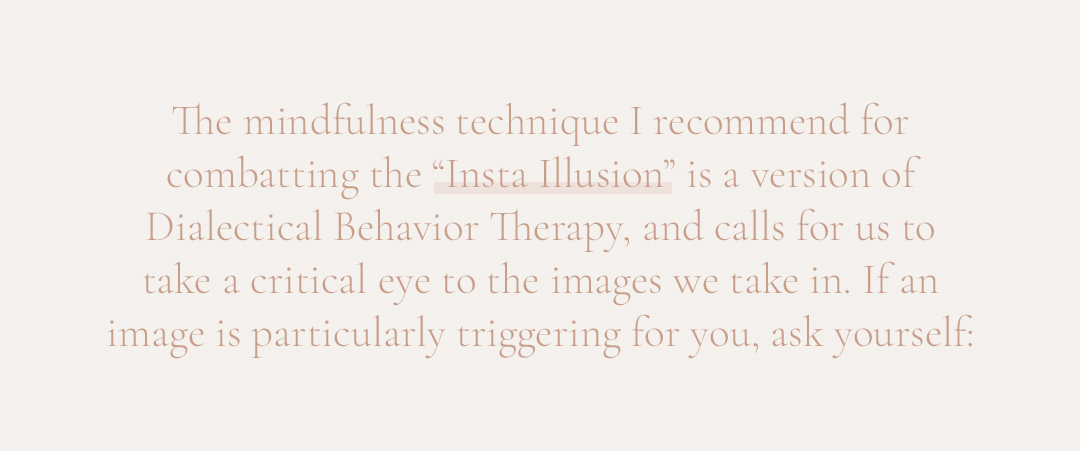June 22, 2020
The Insta Illusion: Self-Esteem
Self-esteem is extremely important in everyday life. The human propensity to believe what we see has made us susceptible to the images on Instagram and its ilk since online platforms were created. Pre-Covid, however, we were at least somewhat protected by the fact that we were able to venture out into the world and confirm whether our impression of certain people and things was correct. Now, depending on which state you live in—and certainly in California, where our practice is based—it is significantly harder to make our own assessment of the reality we are being offered, leaving us more vulnerable than ever to the images and ideas we consume.
Take, for example, your friend with the superlative life, whose every movement appears to be dipped in glitter, whose husband is always adoring, whose every day seems ever-elevated. Back when you could knock on her door unannounced and see that her hair was all frizzy and her husband was icing her because she’d spent too much on a new rug—which, by the way, her dog had just thrown up all over—you were able to distinguish the reality of her very mortal life from the pageantry of her online fantasy. Now, by contrast, you might find yourself falling prey to the illusions that are peddled by everyone from Instagram influencers to your Aunt Maureen—lacking, as it were, the ability to investigate for yourself. Indeed, we are more confined, more isolated, and more defenseless against the false realities with which the Internet is replete, which could negatively affect your self-esteem.
So what, in these strange times, can we do to have healthy self-esteem? We can’t just burst out of quasi-quarantine en masse, demanding to lift the veil on whether our down-the-street neighbor actually reshaped her bum via Peloton, or whether our long-time frenemy really got rid of her melasma using Apple Cider Vinegar. But what we can do—what we can always do—is be mindful of the forces that are operating on us, and strive always to be discerning consumers of any information we take in, and not let it negatively affect your self-esteem. In this way, we strive to protect ourselves from playing the comparison game of thinking everyone we see online is more attractive, wealthier, happier, and all-around better than us—a fallacy that sentences us to a life of misery where happiness is always out of reach (and right down the block, in someone else’s perfect hands).
– Could this image be altered in any way to be more favorable to the poster?
– What does it say about the person posting this image, that this is the view of their life they’re proffering during a pandemic?
– What is the likelihood that this image presents a clear picture of reality?
– Does this image look like any reality I’ve ever personally experienced?
– What can I do to stop perpetuating myths of an ideal that makes others feel less-than, and that almost no one can live up to?
Finally, I always emphasize to my clients that the things we choose to look at on a daily basis can do a lot to shape our world view, so we should always exercise care in curating our feeds. If your Instagram is filled with images of women and men with modelesque bodies, coiffed hair, and an endless stream of brand-new designer accouterments, you are subjecting yourself to a slice of the world that almost no one can (or should) live up to. Appreciable increases in self-esteem can come from following people with all different body sizes, from all different races, with different messages and viewpoints—both from each other and from our own. It may seem like a small step, but it’s something we can all do to not only make ourselves feel better but to embrace the whole of our society and world—beautiful, imperfect, diverse, and incredibly human.






